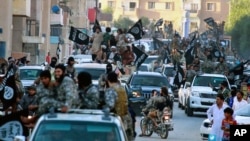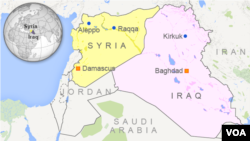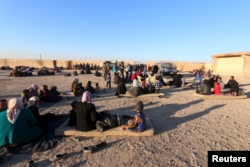Islamic State militants are cracking down on the few remaining Christians and preventing them from leaving Raqqa, Syria, local activists tell VOA.
“Christians are the most vulnerable group... in the country,” said Hussam Issa, an activist with " Raqqa is Being Slaughtered Silently," a group that monitors IS activities in the city.
“They don’t have protection,” said Issa, who fled to Turkey. “They don’t have any armed militias that can defend them.”
Christians, who have lived in Raqqa for centuries, made up nearly five percent of the 400,000 prewar population, local activists said. That percentage has dramatically dropped after Raqqa fell to anti-government rebels and was later taken over by IS militants in 2014, becoming their de-facto capital.
IS Persecution
Activists report that 43 Christian families remain in the city. They couldn’t afford to flee the city as other Christians did when the militants took over Raqqa, they said. When IS militants seized Raqqa in January 2014, they gave Christians three options; convert to Islam, leave the city, or face death.
Many Christian families left to avoid persecution.
“My family and I had to flee Raqqa,” said Jimmy Shahinian, a Syrian Christian activist who is now in Germany.
Shahinian said his family and other Christians were attached to their homes and lands in Raqqa, but IS treatment became so unbearable that they had to escape and leave everything behind. Last December “my mother was the last one from my immediate family to flee,” he told VOA.
IS imposed a set of strict rules on Christians, forcing them to adhere to Muslim dress codes and to pay jizya, an Islamic form of taxation designed for non-Muslims.
Activist Issa said when he was living in Raqqa militants kidnapped and murdered a young Christian man for having a cross tattoo on his arm. They were hundreds of incidents of which IS targeted the Christian population in the city, he said.
Christian properties have been confiscated by IS commanders and Christians who remain are prohibited by IS laws to buy properties, he said.
Last week, as Christians throughout the Middle East celebrated the ancient Babylonian New Year, Akitu, those in Raqqa were forbidden from holding the Christian ritual.
“Prohibiting Christians from practicing their religion is normal for a group like Daesh [IS],” said U.S-based Syrian journalist Hadeel Oueis who often writes about the plight of Christians in Syria. She is a Syriac Christian from the northeastern province of Hasaka.
Genocide
Oueis said when IS fighters entered Raqqa, they demolished a revered Armenian memorial and shuttered and burned the two churches that belonged Christians. She said IS considers Christians as allies of Western powers.
U.S. Secretary of State John Kerry said last month that atrocities committed by IS militants against Christians, Yazidis and other religious minorities in Iraq and Syria constitute genocide.
The genocide declaration means the United States would prosecute any Islamic State member in the United States, but it does not obligate any specific American action against the terror group in Syria or Iraq, where U.S. warplanes have been striking IS targets for months.
But activists say they hope the designation leads to U.S. action to provide protection to ill-treated Christians throughout the Middle East.
The United States should do “something similar to what the Americans did for the Yazidis [it] is urgent to protect the Christians in Raqqa,” journalist Oueis told VOA, referring to a 2014 U.S. operation that rescued many Yazidis on Mount Sinjar after IS fighters swept into their city.
Since its takeover in Syria, IS has kidnapped hundreds of Christians from Raqqa and Hasaka provinces. Some of them have recently been released after huge ransoms were paid to the militant group, news reports said.
Locals say IS fighters in Raqqa are now using Christian families as human shields to deter coalition and Syrian warplanes from hitting its positions.







